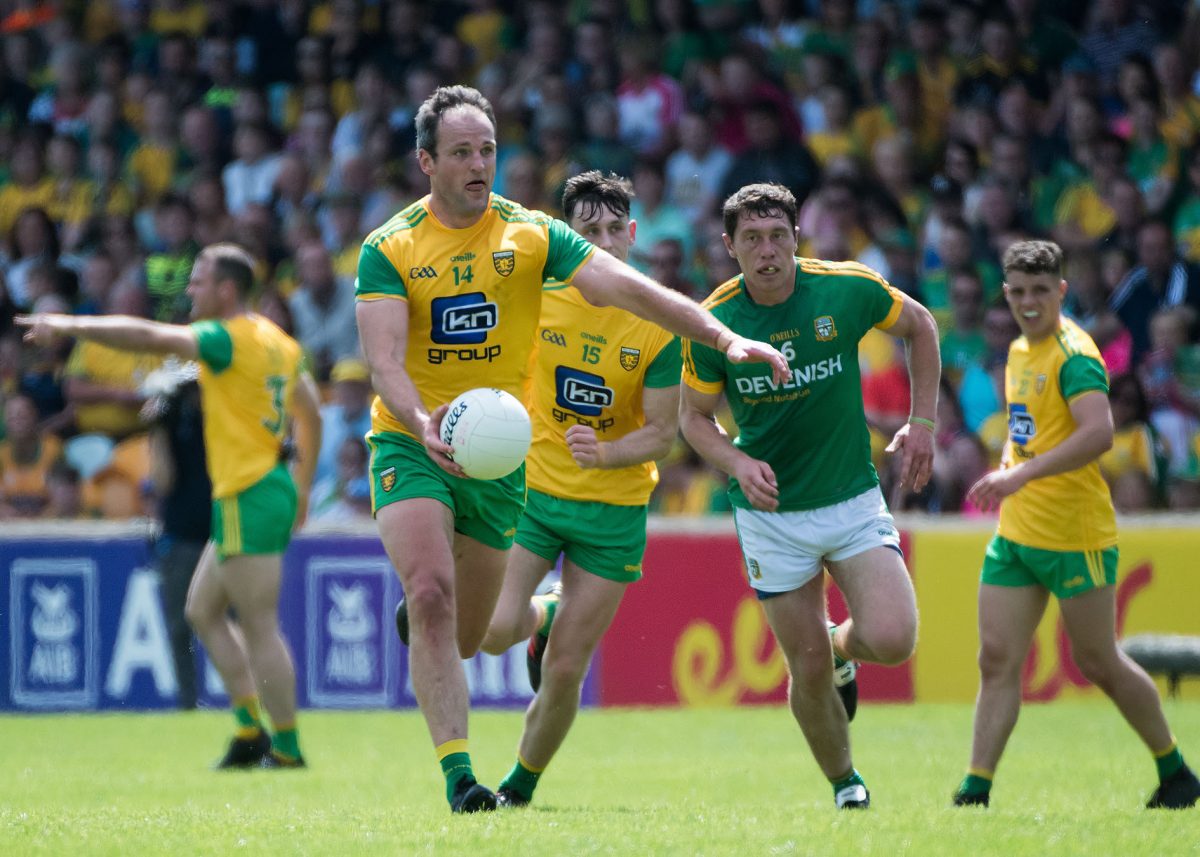WHEN JIM McGuinness finally got the nod, he knew who his first call would be.
McGuinness had made two unsuccessful bids to become the Donegal senior manager. For the 2010 term, McGuinness was handed the reigns of the Donegal Under-21s.
His county wasn’t impacting at any level never mind many levels.
The nature of the unforgiving U21s meant it was a sink-or-swim operation.
‘I knew I had to make this count and that we couldn’t hold back,” McGuinness wrote in his autobiography Until Victory Always.
McGuinness already had a plan – and he was clear who he wanted as his lieutenant.
He remembered: ‘The very first thing I did was ring Michael Murphy and ask him to be captain. I didn’t have a relationship with Michael at that time. but I knew enough to know I wanted him as captain’.
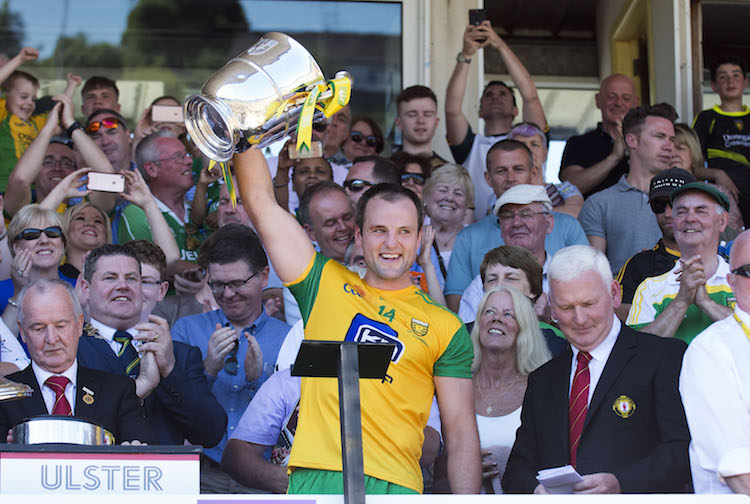
Michael Murphy lifts the Anglo Celt. Photo Evan Logan
A weeks later, McGuinness arranged a challenge game against Sligo at Fr Tierney Park. Murphy had a family confirmation to attend, but McGuinness needed his man.
‘Michael came into the dressing room in his suit. It was hard on him and we could have played the game without him, but it was important that there be no excuses, not even from him – especially not from him’.
Murphy has been captain of Donegal from that moment to this.
Tomorrow, when he bursts out from the bowels of the Hogan Stand, he’ll lead Donegal seniors out for the 53rd time as captain. It will be his 150th game as a senior footballer in Donegal’s colours.
“I still love playing with Donegal,” the Glenswilly man says.
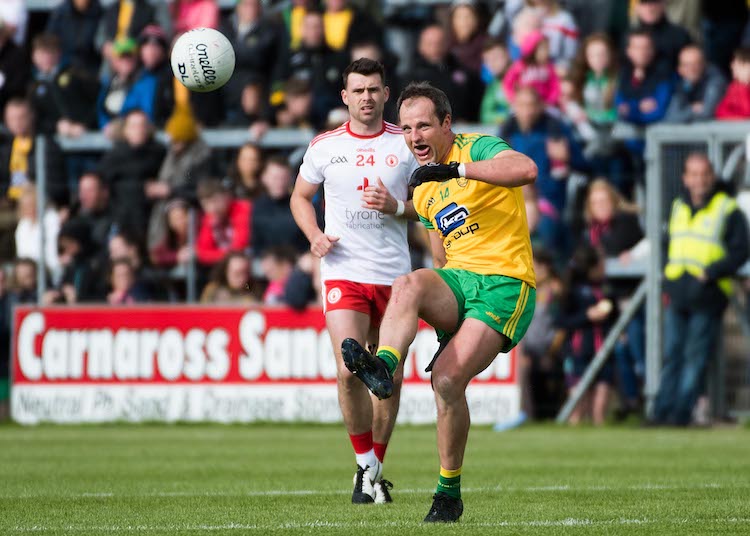
“I’m still that six, seven, eight-year-old puling on the Donegal jersey, going to MacCumhaill Park to train on a Tuesday evening. That’s what you want to do at that age and having the captaincy along with that is brilliant.
“It’s the same for me as it is for Oisin Gallen in terms of the two of us just wanting to perform every time we train or play. The pressure of the captaincy comes when you play poorly and the results don’t come.”
Murphy has captained Donegal to Sam Maguire, to five Ulster titles, two Division Two crowns and an Ulster U21 win.
It has been the golden period for Donegal. Before 2011, Donegal had won only five Ulster titles. They’ve added the same again since with Murphy raising each piece of silverware with as much gusto and pride as the last.
He says: “It is still the same feeling.
“It’s a fantastic honour every day to wake out of the bed, it’s one of the first thoughts that crossed the mind: ‘You’re a Donegal footballer and you’re the Donegal captain’. I carry it and it’s not a burden.
“From day one, I was very lucky. From the outside, the captaincy is looked on maybe with more involvement than there maybe is.
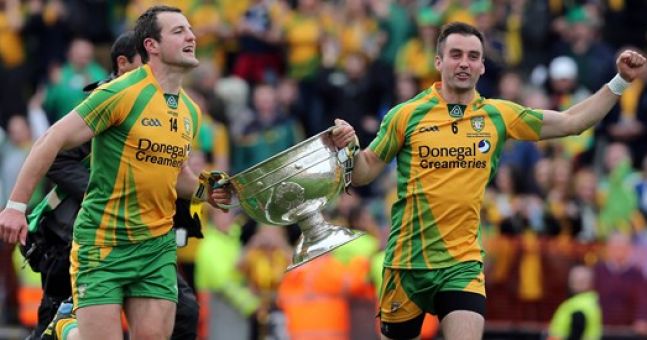
Karl Lacey and Michael Murphy with the Sam Maguire Cup after Donegal win the All-Ireland in 2012
“Rory Kavanagh was there at the time, Neil Gallagher, Kevin Cassidy, Karl Lacey, a pile of captains and leaders. It’s maybe only now looking back that you realise how much those boys dug Donegal out.”
Murphy didn’t win an Ulster SFC game until Antrim were dispatched in 2011.
That year, Murphy led Donegal to their first Ulster title in 19 years. It was a breakthrough moment that proved a real launchpad.
“Once you win the first one or two, the excitement breeds, belief breeds,” Murphy says.
“A lot of times as Donegal players, we maybe lacked that bit of belief that comes from winning. 2011 and getting Ulster was brilliant for us, but were we any better than a lot of teams that went before us? Definitely not.
“Just all of a sudden, you get this bit of belief and you put it together again. All of a sudden then, you think you should be there whereas beforehand you were nearly shy about being there. That could be down to a certain bit of fear. The growth of the game in terms of numbers since 2011 and 2012 in Donegal has been absolutely brilliant.”
At times in the not-too-distant past, the captaincy seemed a burden to players, who appeared weighed down by the responsibility.
“A lot of that comes down to fortune in terms of success too,” Murphy points out.
“There were better captains before me and there’ll be better captains after me. You’re there, you’re a senior player and you’re looked on and analysed in every day life. You just have to get on with it.
“When you’re in it, you come off the back of a winning season, you want to win more and if you come off the back of a season where you get beat, you want to get back and put that right. That’s generally what takes up the months of winter and spring.”
Murphy’s own role in the team has changed considerably since the days when he was solely known for his exploits as the conventional full-forward.
For a man so influential, there has been a strange level of criticism, the most recent from Colm O’Rourke on RTÉ a few weeks ago. O’Rourke suggested that Murphy often doesn’t perform on the big days. This, in spite of the fact that Murphy is Donegal’s record scorer of all time.
The shoulders shrug when it’s put to him.
“When I was younger, I looked at things and would have taken grudges,” he says.
“Probably since the All-Ireland in 2012, I don’t look at it or read it as much. It’s just about being in the camp and seeing players trying their best. Sometimes things are analysed and it couldn’t be further from the truth. It’s not something that I waste any energy on. It’s the opinion of Declan, Stephen, Karl and the backroom team that we put the trust in. We don’t value anyone else’s opinion.”
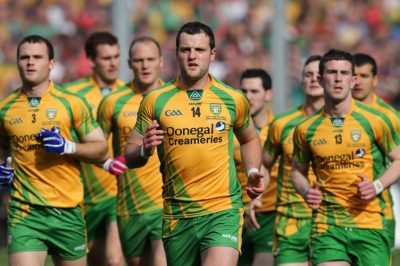
Tomorrow, regardless of what happens when Donegal and Kerry collide at Croke Park in a Super 8 meeting, there will surely be a debate about Murphy and his position on the field.
“I think probably because I wear 14,” he says of the scrutiny.
“It doesn’t really bother me. The way the game is going, everyone is playing as fluidly as the next man. Some peoples’ position are taken a wee bit more. It doesn’t bother me and doesn’t bother the team. You’re given a position and a role and it’s just about doing that well.”
When Rory Gallagher stepped aside as Donegal’s manager after heavy losses to Tyrone and Galway in 2017, the end of the line was feared in Tir Chonaill. The defeats felt like a throwback to the bad old days, but Murphy never doubted – although he did wonder if the fire still raged.
He soon got his answer.
“There might have been a few retirements, but I saw enough of the young crop to know the ability was there,” he says.
“There were still some of the older lads who I soldiered with and I knew what they brought to the table.
“When Declan (Bonner) came in, the big thing was to see if we really wanted it again. There was no doubting the ability, it was just about how much everyone wanted it again. That needs to be there and it was there in general.
“From day one in Declan’s reign, a lot of the older boys just wanted to seize the moment. The younger lads had two or three years there with a glimpse of it. They were hungry and to see their resilience to keep coming in was a big thing to get us back at it.”
Tags:







